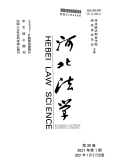河北法学2024,Vol.42Issue(1):2-36,35.DOI:10.16494/j.cnki.1002-3933.2024.01.001
君子之道与法治国家
The Way of Gentleman and the Country Ruled by Law
摘要
Abstract
In the West,"rule of law"means"rule of the majority"(democracy),and"rule of the people"means"rule of the minority."But there is no such meaning in our ancient concept of"rule by law".However,it is acknowledged that law is for the use of Tao,so those who govern the country are"Tao holders".Thus,only the"gentleman"who knows Tao and does in this way can undertake this sacred task.However,"gentlemen"are the minorities in our society.Therefore,"the rule of law"does not mean"the rule of the majority",but"the rule of the gentleman".How to evaluate this kind of"rule of law"?This paper aims to probe into some plain viewpoints on it,and compare that with the western concept of"rule of law".关键词
君子之道/法治国家/执政者/君子之治Key words
the way of gentleman/country ruled by law/governor/the rule of gentleman分类
社会科学引用本文复制引用
严存生..君子之道与法治国家[J].河北法学,2024,42(1):2-36,35.基金项目
国家社科基金重大项目"社会主义核心价值观念与法治文化建设"(17VHJ005)的阶段性成果. (17VHJ005)

